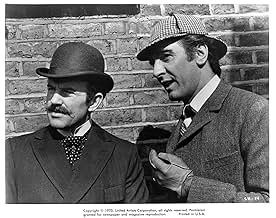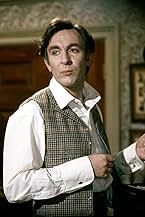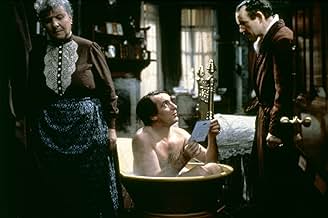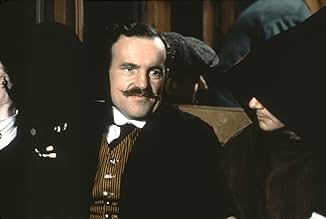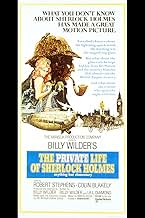When a bored Holmes eagerly takes the case of Gabrielle Valladon after an attempt on her life, the search for her missing husband leads to Loch Ness and the legendary monster.When a bored Holmes eagerly takes the case of Gabrielle Valladon after an attempt on her life, the search for her missing husband leads to Loch Ness and the legendary monster.When a bored Holmes eagerly takes the case of Gabrielle Valladon after an attempt on her life, the search for her missing husband leads to Loch Ness and the legendary monster.
- Director
- Writers
- Stars
- Awards
- 3 nominations total
Geneviève Page
- Gabrielle Valladon
- (as Genevieve Page)
- Director
- Writers
- All cast & crew
- Production, box office & more at IMDbPro
7.014.5K
1
2
3
4
5
6
7
8
9
10
Featured reviews
Not Really Messing With Holmes
This is fun. It wouldn't be if it had strayed too far from the Holmes persona or if it were not a good movie. Holmes is a favorite from childhood, and odd take-offs on him are generally not appreciated. I have settled on the Jeremy Brett series as the definitive version, but enjoy others that are well done. To me, with remakes and other versions, if the piece is well done, it is not only acceptable but enjoyable. With remakes, I don't know what's worse - it being a general flop as a movie or their changing it all around and calling it the same thing. Sometimes, both happen. Usually, if you like the subject matter, you will probably like a good adaptation, if a bit more inventive that the source material. The Seven Percent Solution movie was well done and enjoyable.
I haven't seen a lot of Robert Stephens, but have appreciated what I have. I looked him up and found that this was pretty light fare for his experience. This is a quality portrayal by him, and the others do a good job as well. The overall production is pleasing. The Dr. Watson portrayal mystifies a bit, that here and in other things, they make him sort of ditsy. That doesn't fit the original stories, nor what Holmes' temperament would seem to tolerate as a companion or assistant with his careful work. Maybe it came from the early Rathbone series with Nigel Bruce. Whether intentional or not, he nearly always had a bumbler quality to his portrayal.
This is a worthy production in all aspects, which I would think garnered some critical approval at its time of release. I can see why it would take the public a while to adjust to seeing Sherlock Holmes as presented here. But, it speaks of the film's overall quality that it has aged well.
I haven't seen a lot of Robert Stephens, but have appreciated what I have. I looked him up and found that this was pretty light fare for his experience. This is a quality portrayal by him, and the others do a good job as well. The overall production is pleasing. The Dr. Watson portrayal mystifies a bit, that here and in other things, they make him sort of ditsy. That doesn't fit the original stories, nor what Holmes' temperament would seem to tolerate as a companion or assistant with his careful work. Maybe it came from the early Rathbone series with Nigel Bruce. Whether intentional or not, he nearly always had a bumbler quality to his portrayal.
This is a worthy production in all aspects, which I would think garnered some critical approval at its time of release. I can see why it would take the public a while to adjust to seeing Sherlock Holmes as presented here. But, it speaks of the film's overall quality that it has aged well.
DVD treasures
This has always been one of my favorite movies. A good take on Holmes, a witty story, a bittersweet ending and music by Miklos Rozsa that sets the tone perfectly. When I saw it had become available on DVD I rushed out and bought it, without even checking to see the extras on the disc. The quality of the print is all right, but there are times it should have been better. The extras just kept getting better. Christopher Lee remembers his times playing Holmes in other films as well as Mycroft in this movie. Then there's the film editor who mentions parts of the movie I never heard of. Then the disc shows the deleted scenes in various forms and it's amazing what was cut. There is only one little bit I feel would have explained things in the movie better, but all the scenes are interesting. A must for people who love this film and want a wealth of information.
the mystery of the missing film
I only found out recently that the film was heavily cut. Two whole missing sections - The Curious Case of the Upside Down Room and The Case of The Naked Honeymooners never made it to the theatrical release, as well as a couple of other small sections. Where the hell are they? In these days of extended editions, DVD extras, etc, this would be a perfect chance to show Billy's film as he had intended. Touch of Evil was re-cut to Welles original specification recently, so it is possible - providing you still have access to the material. Even if it is too long - a reported 3 hours and twenty minutes - I'd like the chance to make my own mind up.
The film itself is still of interest. Performances are good, it is atmospheric, both visually and musically and the humour not too out of place. The homosexual/misogyny angle is of particular interest and one of the main reasons why Billy set out to try and make a Sherlock Holmes picture in the first place. Many of Billy's films carry these themes, of course, but Holmes mysterious quality leant itself to this interpretation. And so what? He may be in the closet, but he still falls for Gabrielle Valadon. And the end...very touching, beautifully handled.
The film itself is still of interest. Performances are good, it is atmospheric, both visually and musically and the humour not too out of place. The homosexual/misogyny angle is of particular interest and one of the main reasons why Billy set out to try and make a Sherlock Holmes picture in the first place. Many of Billy's films carry these themes, of course, but Holmes mysterious quality leant itself to this interpretation. And so what? He may be in the closet, but he still falls for Gabrielle Valadon. And the end...very touching, beautifully handled.
"I don't dislike women, I merely distrust them. The twinkle in the eye and the arsenic in the soup..."
Sherlock Holmes is certainly one of literature's all-time most famous characters, the subject of countless novels and short stories by Sir Arthur Conan Doyle between 1887 and 1927. Since then, he has become possibly the most portrayed movie character in cinema history {according to the Guinness Book of Records, over 70 actors have played the coveted part in more than 200 films}. So rich was Conan Doyle's description of Holmes that many readers have come to think of him as a historical figure, and derive enjoyment from speculating on the finer detail's of the private detective's life. Likewise, many authors and filmmakers have decided to expand on the stories of Sherlock Holmes, creating new mysteries that perhaps Dr. John Watson forgot to publish. 'The Private Life of Sherlock Holmes (1970)' is such a tale, directed by master filmmaker Billy Wilder, who also produced and co-wrote {with long-time collaborator I.A.L. Diamond} the film.
'The Private Life of Sherlock Holmes' was originally written and filmed as a three-hour roadshow picture, an episodic compilation of Sherlock Holmes' most difficult mysteries. Unfortunately, the studio's unwillingness to take a risk with such a format meant that entire sequences, including a prologue with Watson's grandson in London, and a flashback to Holmes' university years, were inharmoniously cut from the film. Though I was initially unaware of this studio intervention, I met these findings with anger and frustration; while the surviving picture is merely a good film, Billy Wilder's original vision would certainly have been something special. I hear that at least one episode has been restored into later DVD editions of the film, but most of the missing footage remains, devastatingly, permanently absent. The story, as we now find it, is comprised of two unequal portions: the first concerns Holmes' interactions with a glamorous ballet dancer (Tamara Toumanova), casting doubt on the famous detective's sexuality, while the second mystery demonstrates the efforts of Holmes and Watson to locate the husband of an beautiful woman (Geneviève Page) suffering from amnesia.
When little-known British actor Robert Stephens first appeared on screen as Det. Sherlock Holmes, I wasn't certain that he was the suitable man for the job {Wilder had initially considered Peter O'Toole as Holmes, and Peter Sellers as Watson, before deciding to cast unknowns}. However, despite initially appearing too flamboyant to play Conan Doyle's brilliant investigator, I'm happy to say that, by the end of the film, he had well-and-truly grown on me. While Stephens didn't quite match the stories' depiction of Holmes, this is only because Dr. Watson's dramatisations often tend to embellish the truth and misrepresent facts about the detective's personality and demeanour a point that is alluded to early in the film itself. Colin Blakely, though given very little to do, is a lot of fun as Holmes' companion and biographer, playing the role a lot less serious than I've seen it done in the past. Christopher Lee also appears as Holmes' intellectually-equal brother Mycroft, whose associations with the British government may prove crucial to the case being investigated.
'The Private Life of Sherlock Holmes' was originally written and filmed as a three-hour roadshow picture, an episodic compilation of Sherlock Holmes' most difficult mysteries. Unfortunately, the studio's unwillingness to take a risk with such a format meant that entire sequences, including a prologue with Watson's grandson in London, and a flashback to Holmes' university years, were inharmoniously cut from the film. Though I was initially unaware of this studio intervention, I met these findings with anger and frustration; while the surviving picture is merely a good film, Billy Wilder's original vision would certainly have been something special. I hear that at least one episode has been restored into later DVD editions of the film, but most of the missing footage remains, devastatingly, permanently absent. The story, as we now find it, is comprised of two unequal portions: the first concerns Holmes' interactions with a glamorous ballet dancer (Tamara Toumanova), casting doubt on the famous detective's sexuality, while the second mystery demonstrates the efforts of Holmes and Watson to locate the husband of an beautiful woman (Geneviève Page) suffering from amnesia.
When little-known British actor Robert Stephens first appeared on screen as Det. Sherlock Holmes, I wasn't certain that he was the suitable man for the job {Wilder had initially considered Peter O'Toole as Holmes, and Peter Sellers as Watson, before deciding to cast unknowns}. However, despite initially appearing too flamboyant to play Conan Doyle's brilliant investigator, I'm happy to say that, by the end of the film, he had well-and-truly grown on me. While Stephens didn't quite match the stories' depiction of Holmes, this is only because Dr. Watson's dramatisations often tend to embellish the truth and misrepresent facts about the detective's personality and demeanour a point that is alluded to early in the film itself. Colin Blakely, though given very little to do, is a lot of fun as Holmes' companion and biographer, playing the role a lot less serious than I've seen it done in the past. Christopher Lee also appears as Holmes' intellectually-equal brother Mycroft, whose associations with the British government may prove crucial to the case being investigated.
Thoroughly civilised, delightful entertainment
Billy Wilder's take on the world's most famous detective is both painstakingly faithful and sardonically subversive to Sir Arthur Conan Doyle's idiossyncratic creation. Presented as a case that loyal companion John Watson duly recorded but requested remain secret until long after his death, in which Holmes aids a Belgian woman find her missing husband, a mining engineer hired by an apparently non-existant English company, it makes clever use of the rulebook Conan Doyle set down while at the same time undermining it from within. The title and the plot may seem misleading at first - the first half hour especially seems at odds with what comes afterwards - but in fact if you're a Holmes fan you'll quickly realise that this is as close to romance as the detective would ever allow, and Wilder tells it through a masterful accumulation of small touches that only someone as meticulous as the man himself would notice. Script-wise, it's a cracking mystery in the best Doyle tradition, with all the time-honoured twists and turns present and correct. The acting is also up to Wilder's usual standards; Stephens and Blakely are an engaging duo as a bored Holmes and a bumbling Watson, and there's a hysterically funny supporting turn by the always underrated Revill as a Russian ballet impresario. Wilder's trademark pointed cynicism fits the English witticism particularly well, even if at times it all seems a bit too modern for the peaceful Victorian surroundings, but it is quite ironic to see him chiding Britain's stiff-upper-lip, old-fashioned morality when the film seems to be an "old timers' movie" entirely out of sync with its own time. Still, it's hard to find fault in such a thoroughly civilised and delightful entertainment.
Did you know
- TriviaBy the time of filming, Sir Christopher Lee had become famous as Count Dracula. When he and Billy Wilder walked on the shores of Loch Ness at dusk, with bats circling overhead, Wilder said to him, "You must feel quite at home here."
- GoofsThe events start in August 1887 and apparently take place in the following weeks or, at most, months. However, Mycroft Holmes tells Queen Victoria that Kaiser Wilhelm II had Count Zeppelin working on dirigibles that could drop bombs on Buckingham Palace. Wilhelm II did not become Kaiser until 15 June 1888, and Zeppelin did not start constructing rigid airships until the 1890s.
- Alternate versionsOriginally released at 125 minutes; the US laserdisc version adds 12 minutes of unreleased footage, including a sequence known as "The Dreadful Business of the Naked Honeymooners", featuring Jonathan Cecil and Nicole Shelby
- ConnectionsFeatured in The Many Faces of Sherlock Holmes (1985)
- SoundtracksConcerto for Violin and Orchestra Opus 24
by Miklós Rózsa
Details
- Release date
- Countries of origin
- Languages
- Also known as
- Das Privatleben des Sherlock Holmes
- Filming locations
- Production companies
- See more company credits at IMDbPro
Box office
- Budget
- $10,000,000 (estimated)
- Gross worldwide
- $19,930
Contribute to this page
Suggest an edit or add missing content


